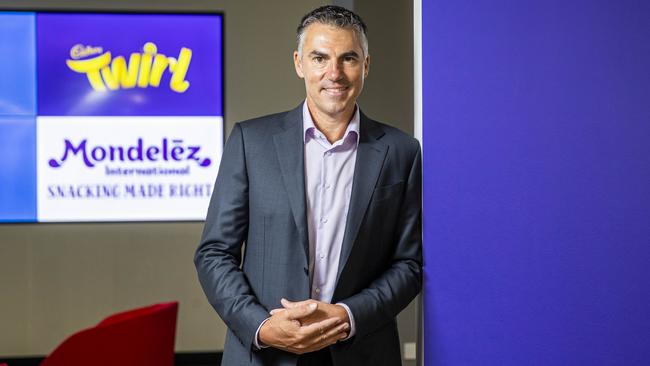Mondelez chief hits out at profit shaming in food industry
Food makers could head the way of local car, textiles industries and shift overseas if profit shaming and cost pressures are not addressed, Mondelez Australia chief Darren O’Brien says.

The local boss of one of the world’s largest supermarket suppliers, Cadbury owner Mondelez, has warned of a ‘cost of manufacturing crisis’ that is equally as painful and dangerous to the Australian economy as the ‘cost of living crisis’.
Mondelez Australia chief executive Darren O’Brien said it had become “undeniably expensive” to manufacture in Australia, and the crisis could see food manufacturers shut down and shift overseas.
Speaking at the Australian Food and Grocery Council conference, Mr O’Brien said manufacturing food in Australia has been hit with soaring input costs from energy to transport, and the cost pain was worsened by overly-complex reporting requirements, especially around climate issues.
Mr O’Brien, who is also chairman of the AFGC which represents the $140bn food manufacturing industry, delivered a chilling warning that once thriving industries like automotive and textiles were now largely or entirely imported and that the food and grocery industry could go the same way, making Australians heavily reliant on imports for food.
“History serves as a stark reminder of what happens when industries fail to adapt. Once-thriving sectors like the automotive and textiles industries are now largely or entirely imported,” he said.
“We cannot afford to let the same fate befall our food and grocery manufacturing sector. It’s imperative that we embrace change, support innovation, and invest in the future of our industry. To ensure our industry’s future, we must embrace and support it, rather than attack it.”
Mondelez brands include Cadbury, Ritz crackers, Toblerone and Sour Patch Kids lollies.
Mr O’Brien also hit out at the string of inquiries into the supermarkets, labelling them political displays to grab short term headlines, and savaged people who were “profit shaming” businesses and said the food manufacturing industry had been deprioritised by policymakers and demonised for rising costs.

Mr O’Brien focused his most strident comments on the rising cost of doing business in Australia for food and grocery manufacturers that he said was a similar to the cost-of-living crisis impacting end consumers.
“There is no denying there is a very real cost-of-living of crisis not only in Australia, but in many economies across the world at present,” he said.
“We are not just experiencing a cost-of-living crisis, but also a cost-of-manufacturing crisis.”
The cost pressures Australian food manufacturers were burdened with made Australia one of the most expensive countries in the world to operate, with politicians avoiding key reforms, he said.
This was being made worse by some in the community who “profit shame” companies without understanding that profitable and sustainable businesses are a basic requirement for a company to maintain its investment.
“While multiple inquiries and political displays may grab short term headlines, they fail to address the fundamental drivers of cost pressures. Profit shaming has become prevalent, but industry profitability is essential for driving investments, creating jobs, and fuelling innovation,” he said.
“Australia’s manufacturing environment is undeniably expensive. Prices are up because we’re experiencing higher costs right across the value chain, eroding margins and requiring pricing actions as one of the levers to preserve profits.
“Maintaining a business’s profitability is not something to be criticised or vilified. Without profitability, businesses struggle to grow.
“They cannot invest in new capital, advertise, sponsor, employ or innovate. Ultimately, without profitability, you will have a shrinking domestic industry.”
Last week The Australian reported that global food giants Mars, Nestle and PepsiCo had issued stark warnings about the cost of manufacturing in Australia, citing sky-high energy bills and accelerating wages.
Mars said its six Australian factories were among the most expensive to run its global network of 130 factories. Joined by other major grocery producers such as Procter & Gamble and Unilever, the suppliers warned Australia was one of the costliest countries in which to do business.
Mr O’Brien said Australia’s infrastructure remained inadequate, with deficiencies in rail lines and transport solutions hindering efficiency and driving up costs throughout the supply chain. Transport costs continue to rise, with accelerating energy prices a threat to the industry.
“Energy prices have soared, and we urgently require a strategy that ensures reliability, cost efficiency, and investment certainty for market participants. Soaring energy prices and questions on reliability pose a significant threat to our operations, highlighting the urgent need for a comprehensive strategy that provides stability and certainty for market participants in the manufacturing sector.”

The food manufacturing boss also hit out at overly complex reporting requirements also placed on manufacturers that were costing time and money.
“Not only is Australia one of the most expensive places to manufacture, but it’s going to have one of the biggest and most complex reporting industries in the world. Complexity exacerbates costs, whether it’s constant changes in packaging and labelling or a reluctance to embrace digital technology.
“The burden of complexity and red tape further exacerbates our challenges, stifling innovation and driving up costs unnecessarily. On climate, for example, there are too many examples of where the emphasis is on what we report, not on what we do to shift the results we are reporting.
“One of my fears around scope three emissions reporting is we will create an industry of capturing and reporting.
“It’s another example of where more cost and more burden of compliance has been placed on manufacturers beyond what their core competency is, which is actually to manufacture safe, high-quality, cost-effective goods.”






To join the conversation, please log in. Don't have an account? Register
Join the conversation, you are commenting as Logout